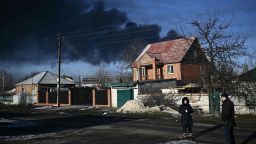“We must save Ukraine today and save the democratic world.” With those words to the Ukrainian people, President Volodymyr Zelensky laid out clearly the stakes of this unprecedented moment.
After months of military build-up and increasingly frantic diplomatic maneuvering from the West, Russia has invaded its neighbor to the west. This invasion of a sovereign country returns Europe to dark days not seen since the end of World War II.
The future of the post-1945 Western world order is at stake. NATO Secretary General Jens Stoltenberg said Thursday this was a “grave violation of international law [by Russia], and of the principles on which European security is built.” He is absolutely right.
With this invasion, Russian President Vladimir Putin has placed himself in the ranks of the pariahs and the rogue leaders of the world. Indeed, he is now acting even more unpredictably than the leader of North Korea in that hermit kingdom so far away from Europe. None of the Russian experts I spoke to in recent weeks expected such a blatant total invasion, and Putin’s diplomats repeatedly denied such actions would ever be taken.
Yet Putin has shown that he will stoop to endless depths to carry out his own paranoid, myth-making, grievance-nursing agenda. It was all the way back in 2007 that signs of this first became clear, when in a speech at the Munich Security Conference Putin took aim at NATO expansion and a United States-led uni-polar world order, labeling it “pernicious.”
Yet as this current crisis gathered steam, the US and NATO took strategic ambiguity off the table from the beginning. They vowed to not put any troops or a single weapon offensively into Ukraine. Some I have spoken to believe that was a grave mistake, and that Putin only understands strength.
In particular, it is the leaders of the Baltic countries on Russia’s doorstep who are most worried – and with good reason. While the EU, the US, and NATO are fully united in a way we haven’t seen for a long time, the question remains whether their response will be strong enough to counter the Russian President.
There’s an adage often attributed to Lenin which helps explain Putin’s mindset: “You probe with bayonets: if you find mush, you push. If you find steel, you withdraw.” It is the US, NATO, and the EU who need to erect that steel – and fast.
This week, European Commission President Ursula von der Leyen tried to reassure allies when I asked her about their resolve: “If one square centimeter of NATO allies is attacked by an aggressor from outside, all NATO allies will stand as one and defend this territory,” she told me. “This goes for our territory, very clearly. And I know that these frontline states can absolutely rely on that.”
Just five days ago I sat face-to-face with President Zelensky in Munich and asked him why he had left his country at such a critical time. He explained that no decision about Ukraine could be made behind Ukraine’s back, and more importantly, that he would not abandon his country. “I would like to say that I had breakfast in the morning in Ukraine, and I will have my dinner in Ukraine as well. I never leave home for long,” he said.
In his speeches to the nation overnight Wednesday into Thursday, apparently recorded on a smartphone, Zelensky appeared determined to stay. But with Russian soldiers already appearing at the airport on the outskirts of Kyiv, there is an urgent concern as to whether he and his government are safe – or whether Putin’s aim is to rapidly remove Zelensky and his administration and install a puppet regime.
In interviews with CNN correspondents over the past month, it is clear that many Ukrainian citizens are determined to resist. Whether such resistance would present a serious challenge to the invasion is less clear.


